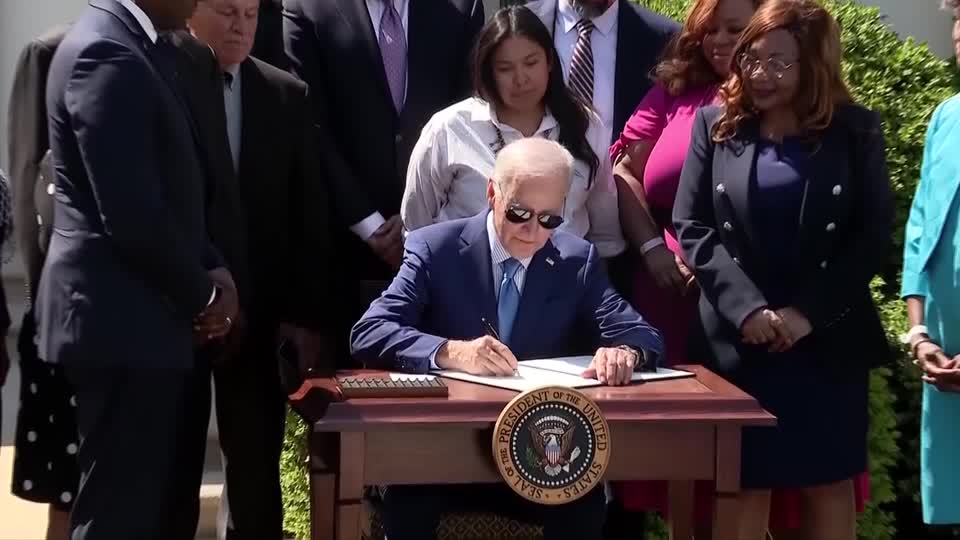
Willie R. Tubbs, FISM News
[elfsight_social_share_buttons id=”1″]
The United States executive branch expanded by one office Friday after President Joe Biden inked the 112th executive order of his presidency.
Biden’s latest executive order, among many other things, requires all federal agencies to seek “environmental justice for all” and creates the Office of Environmental Justice, which will operate in the White House and will coordinate the effort.
“Earth Day is tomorrow — a chance to reflect on the national wonders of our nation and our planet,” Biden said in a speech announcing the new measure. “But we have to do a great deal more than just reflect. We have to commit ourselves to action.
“Will we step up to our ambitions? Will we stand together to meet the great challenges we have? Will we preserve our planet for future generations? History is going to judge us by how we answer these questions. And that’s not hyperbole; that’s a fact.
“And today I hope the answer is going to be a loud and clear ‘yes.’ Yes, we’re committed to following the science. Yes, we’re determined to strengthen the ambitions — our ambitions and actions. And, yes, we will include communities that have been denied basic security, basic dignity that comes from clean air — having clean air, clean water, clean energy jobs, and environmental justice.”
The general thrust of the order is that certain communities – specifically, communities where the majority of inhabitants are people of color – are more affected by environmental crises than others.
“For far too long, communities across our country have faced persistent environmental injustice through toxic pollution, underinvestment in infrastructure and critical services, and other disproportionate environmental harms often due to a legacy of racial discrimination,” the White House said in a statement.
While certainly connected to Biden’s stated goal of combating climate change, the order also dealt with immediate and pressing issues like the accidental release of hazardous materials.
One of the tenets of Biden’s newest executive order was that federal agencies are now required to notify communities most affected if a toxic substance is released from a federal location, something one would assume was either already a rule or at least a standard practice but a rule Biden insisted was crucial.
“This is about people’s health. It’s about the health of our communities. It’s only about the future of our planet,” Biden said.
Biden, as has become his practice, also took multiple chances to criticize Republicans for opposing his climate initiatives.
But, on this occasion, the president’s critique seemed misplaced. Republican lawmakers were shockingly silent on the executive order.
Conservative attention, as of this writing, was focused almost exclusively on the burgeoning investigation of Hunter Biden, the president’s son.
Republicans have in no way flip-flopped on the climate question, though. A day before Biden signed the order, Senate Minority Leader Mitch McConnell (R-Ky.) penned an op-ed in which he blasted Biden for increasing regulation on farmers and businesspeople.
“Democrats want to give Washington bureaucrats new power over every ditch and puddle on American farmers’ land,” McConnell tweeted. “Kentuckians know that’s not commonsense conservation. We have to stand with rural America and stop @POTUS’ power grab.”
Democrats want to give Washington bureaucrats new power over every ditch and puddle on American farmers’ land. Kentuckians know that’s not commonsense conservation. We have to stand with rural America and stop @POTUS’ power grab.https://t.co/GUwF51e9JO
— Leader McConnell (@LeaderMcConnell) April 21, 2023
Other Republicans, like Wisconsin Sen. Ron Johnson, have issued what amounts to a blanket rejection of all of Biden’s ideas.
“Had you set out to design a plan to destroy this country, I don’t think you could have come up with one better than what @POTUS is actually implementing right now,” Johnson tweeted.
Had you set out to design a plan to destroy this country, I don't think you could have come up with one better than what @POTUS is actually implementing right now. pic.twitter.com/iaZUosQ5JF
— Senator Ron Johnson (@SenRonJohnson) April 21, 2023
The nuts and bolts of the executive order are a combination of programs, campaigns, and general guidance with little in the way of a description of concrete steps that will be taken or how much money will be spent.
Among the small number of precise statements found in the order is one requiring all agencies to ensure that 40% of all federal investments go to the target communities.
The list of more general proclamations includes promises, but not really a specific plan, to pursue “an ambitious regulatory agenda,” adopt a policy of “respecting and elevating Indigenous Knowledge,” and make “historic investments in environmental justice.”
